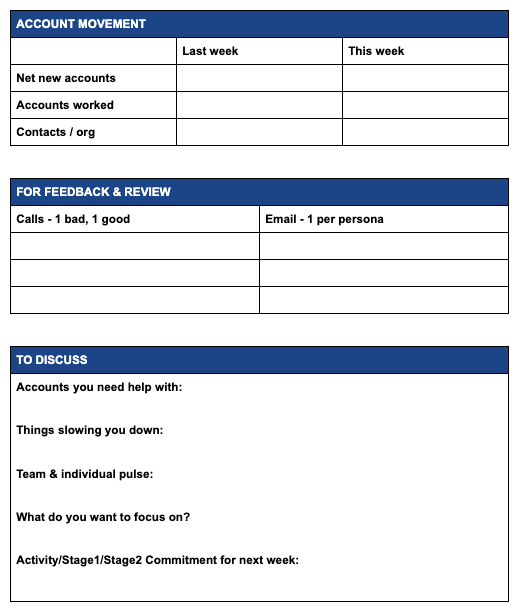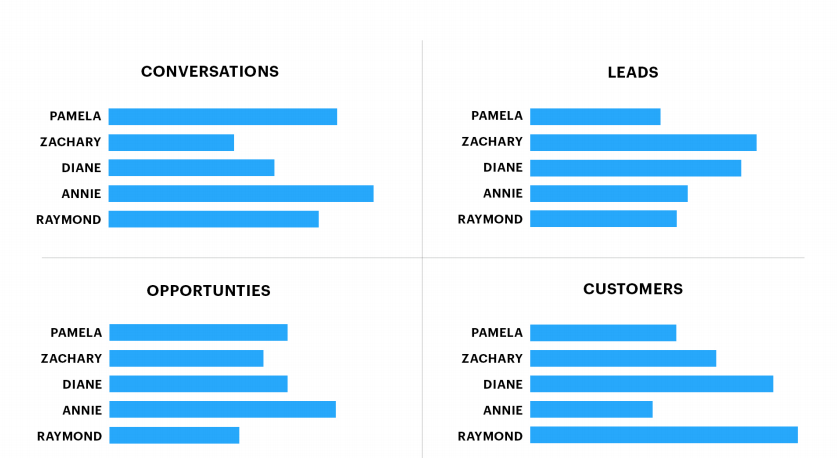
Get your team up and over the line with data-driven sales coaching
Main illustration: Dalbert B. Valerino
Sales has an unavoidable reality: sometimes, your team won’t hit their numbers.
If your team isn’t reaching their goals, what are you doing as a leader to help them get up and over the line? Every sales manager should know how to effectively coach their reps. This coaching helps them drive their team and their company to greater productivity and higher sales.
I’ve been working to develop a sales coaching program that’s backed by one critical element: data. Today, I want to share with you a few ways that you can weave data into your own sales processes to make them more effective for growing the skills of your reps.
What is sales coaching?
Sales coaching is a series of teaching methods used empower sales reps to improve performance and achieve their goals. Sales coaching is collaborative and hands-on, requiring a manager to dig in and work closely with their reps one-on-one.
The concept of coaching is different from sales training: sales training is usually the same for everyone, while coaching is based on the individual needs of each rep. Instead of relying on structured training methods like documentation or classes, coaching requires leaders to understand what their reps’ weaknesses are so they can adjust them and develop new strengths.
As coaching expert Matt Cameron says, the difference between training and coaching in sales is a lot like the difference in professional sports. It all comes down to empowerment of the individual player:
“In sports, a coach stands on the field and calls out plays; a trainer outlines the specific moves in a play and then drills that play. And in sales, a coach empowers reps to figure out, with some guidance, the next best steps to success. A trainer, meanwhile, essentially says, ‘do this.'”
A few examples of sales coaching methods that we use at Intercom include:
- Shadowing customer calls or meetings: Reps tag along on a lead’s call or customer visit and directly observe successful sales methods and communication styles.
- Reviewing call recordings or videos: Reps review their own calls with their lead to identify weaknesses and make plans for improvement.
- Check-in meetings: We have weekly and monthly check-ins so leaders can monitor a rep’s progress and ask targeted questions to determine needs.
- Group conversations: All our reps gather in the room or on the same call to share wins, tips, and ideas among the group.
Why data drives sales coaching at Intercom
Having conversations about performance can be hard, especially if a rep isn’t doing well. At Intercom, we’ve found that relying on data makes these conversations easier: it gives us something to fall back on when we say “you’re doing well” or “there’s room for improvement.”
Data also helps us identify the exact ways each of our reps can improve. When we segment our data by lead types, meeting types, and so on, we can get a clear view of what’s happening and why. Instead of saying “you need to have more calls” or “you should send more emails,” we can go to our reps and explain, say, what types of calls they should be focusing on, and how more of those calls will translate into higher sales long-term.
5 data-driven sales coaching tips for sales managers and leaders
Doing the job of a coach isn’t as simple as offering a few words of solid advice or holding the occasional whiteboarding session: it means working hand-in-hand with your reps. Effective sales leaders combine the knowledge of their entire team with data to identify opportunities for improvement and, in turn, maximize each rep’s performance.
Before you start coaching your sales team, it’s a good idea to learn what’s worked for other companies in the past. Here’s a collection of five proven sales coaching tips based on my own experiences.
“Effective sales leaders combine the knowledge of their entire team with data to identify opportunities for improvement”
1. Ask your reps about their goals first
Historically, I’ve found coaching to be most effective when my conversations – and the data I bring to the table – are focused around a rep’s professional goals.
Before you start coaching a specific rep, find out where they are in their sales career. Then ask them directly about their goals. Do they want to learn new skills so they can communicate more clearly with prospects? Or do they eventually want to get promoted?
Once you have clarity on the long term, frame your coaching around these goals and the data that will help them reach them. For example, if a rep needs to increase the number of prospects they’re communicating with to become eligible for a promotion, that’s hard, actionable data you can bring to your one-on-one.
2. Teach your reps to manage up
One of the first things I teach new reps is how to manage up. This means showing them how to proactively spot areas where they need to improve, and the benefits of proactively asking for feedback or structured training. Basically, they need to take control of their own careers.
When I start working with a new rep, I give them a data sheet that they’re responsible for filling out themselves. It includes information like the number of net new prospects, how many of each meeting type they’ve booked, and how many deals they’ve closed. I ask them to come to our one-on-one meetings each week with the sheet completed.

Example data sheet that I ask my reps to fill out. Download the template here
Ultimately, reps become responsible for both tracking their data and pulling insights from it. And over time, our coaching conversations gradually shift away from me suggesting improvements to them proactively using the data to highlight how they can do better.
3. Set realistic goals
Sales coaches can’t just decide that a sales team should have 100 sales a month if, historically, they’ve only ever been able to reach 50. Coaches need to set realistic goals for their team based on the data available.
“Setting goals based on your reps’ actual performance gives you a realistic understanding of what your team is capable of”
Setting goals based on your reps’ actual performance gives you a realistic understanding of what your team members are capable of. It also helps you spot opportunities for overall improvement that can be achieved with your coaching.
Here’s a good example of that empowerment in action. Looking at this data, I can see that in the last month, Zachary chatted with the fewest number of website visitors, but generated the most qualified leads. On the other hand, Annie chatted with the most website visitors, but generated fewer leads:

As a coach, your job is to use this data to influence your coaching. In this situation, you’d probably dig into what Zachary is nailing in his conversations that helps him convert more visitors into leads. Once you learn that, you (or Zachary) can share that with Annie, enabling her to reach the same monthly lead targets.
4. Look for gaps in individual performance
Analyzing sales data can also help you drill down and look for opportunities to improve the individual performance of your sales reps.
Let’s say I’m taking a closer look at Annie’s monthly sales performance:

The data here is showing me that Annie is successfully getting leads who create an account to trial Intercom, but she’s having a harder time persuading them to convert into a paying customer. Knowing this, I can determine where Annie needs coaching on a granular level, and work some suggested strategies into my conversations.
5. Understand when to stop coaching
If you’re using data effectively, sometimes you’re going to encounter hiccups in the sales cycle that are out of your control. Bugging your reps to close more deals won’t be effective if, say, their pipeline is operating at a much lower volume than usual.
We recently found that our sales development reps (SDRs) were booking meetings with some fantastic prospects, but fewer of these opportunities were being won than we anticipated. When we dug into the data, we found that about 30% of these opportunities were lost because the account executive (AE) didn’t follow up with the prospect quickly enough.
Since my team is made up of outbound SDRs, this is a situation where I can’t effectively resolve the issue through coaching. What I can do is talk to someone else within our sales team about improving the followup of AEs so fewer of our outbound efforts go to waste.
Combining data with other coaching best practices
Although data drives most of the coaching I do for my team, it’s not the only thing that matters. Successful coaching involves clear, two-way communication, and giving your reps exactly what they need to be successful long-term. Try these tactics:
- Promote communication between your reps: Coaching should be done one-on-one and as a team. If you encourage your reps to help other members of the team with questions and tricky situations, they’ll start to coach each other, improving your overall success.
- Share your wins: I have a Slack channel for my sales team. Every time reps get a meeting opportunity, I ask them to share why and how they got it. They also share the call or email that yielded that meeting, which helps other reps learn new tips and ideas for approaching prospects.
- Ask for help: Sales coaching is not a one-person job. Talk to other leads, reach out to the head of sales, and lean on your own manager when you need to. If you need advice on tough situations or struggling reps, get some coaching of your own: it’ll both help you serve your team and stay sharp as a leader.
Effective sales coaching requires long-term focus
At the end of the day, sales coaching is like peeling an onion. You start at the first layer with data about your team’s performance, then drill down into individual performance. When you finally reach the core, you’re able to gather information about the skills that individual reps need to focus on in order to improve, and the kinds of training and incentives required to properly motivate them.
By peeling back these layers, you’re able to become a more effective sales coach. And with that effective coaching comes measurable improvements in your reps’ activities, all resulting in higher sales and elevated customer happiness.







